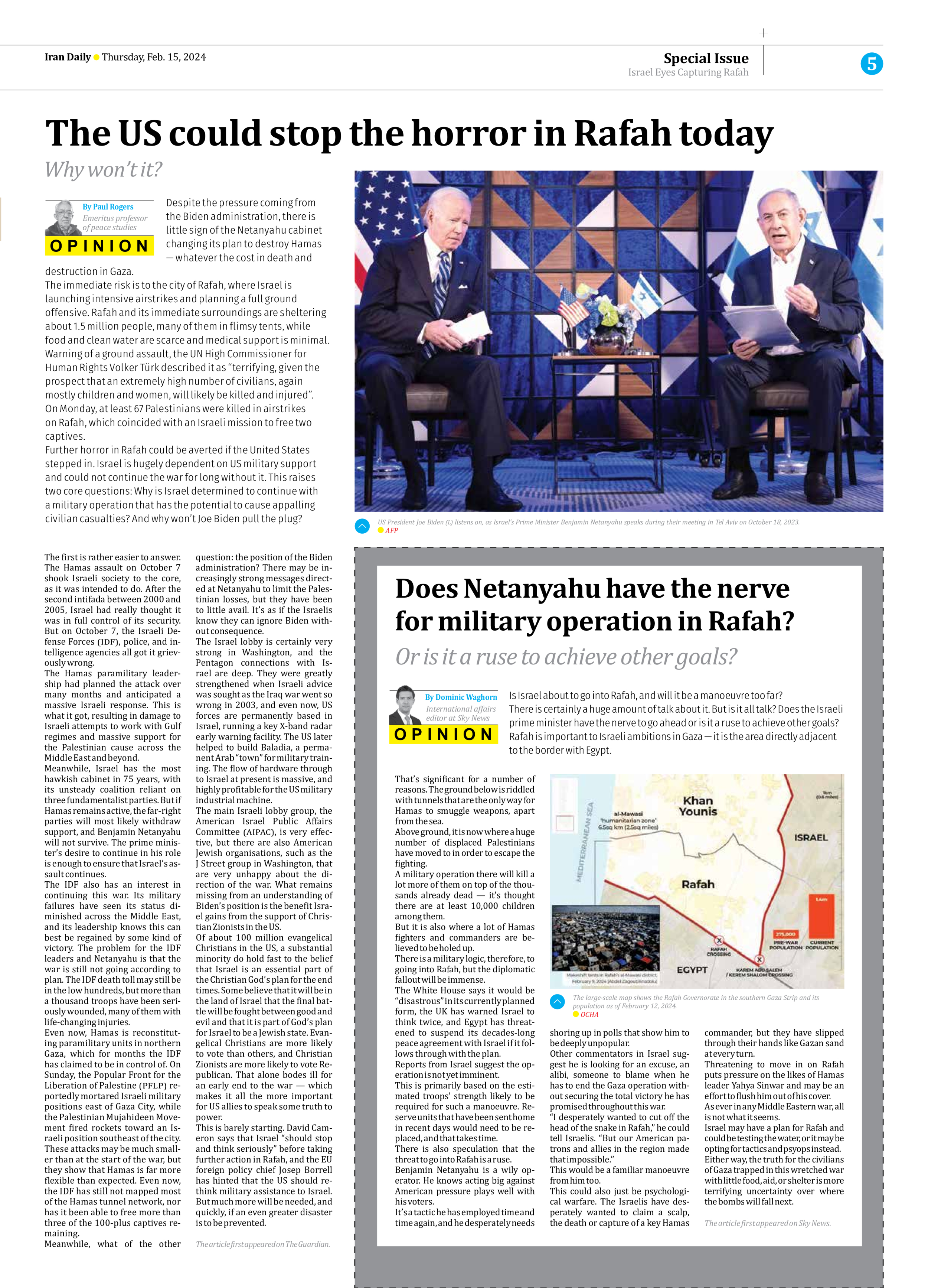
The US could stop the horror in Rafah today
Why won’t it?
By Paul Rogers
Emeritus professor of peace studies
Despite the pressure coming from the Biden administration, there is little sign of the Netanyahu cabinet changing its plan to destroy Hamas — whatever the cost in death and destruction in Gaza.
The immediate risk is to the city of Rafah, where Israel is launching intensive airstrikes and planning a full ground offensive. Rafah and its immediate surroundings are sheltering about 1.5 million people, many of them in flimsy tents, while food and clean water are scarce and medical support is minimal. Warning of a ground assault, the UN High Commissioner for Human Rights Volker Türk described it as “terrifying, given the prospect that an extremely high number of civilians, again mostly children and women, will likely be killed and injured”. On Monday, at least 67 Palestinians were killed in airstrikes on Rafah, which coincided with an Israeli mission to free two captives.
Further horror in Rafah could be averted if the United States stepped in. Israel is hugely dependent on US military support and could not continue the war for long without it. This raises two core questions: Why is Israel determined to continue with a military operation that has the potential to cause appalling civilian casualties? And why won’t Joe Biden pull the plug?
The first is rather easier to answer. The Hamas assault on October 7 shook Israeli society to the core, as it was intended to do. After the second intifada between 2000 and 2005, Israel had really thought it was in full control of its security. But on October 7, the Israeli Defense Forces (IDF), police, and intelligence agencies all got it grievously wrong.
The Hamas paramilitary leadership had planned the attack over many months and anticipated a massive Israeli response. This is what it got, resulting in damage to Israeli attempts to work with Gulf regimes and massive support for the Palestinian cause across the Middle East and beyond.
Meanwhile, Israel has the most hawkish cabinet in 75 years, with its unsteady coalition reliant on three fundamentalist parties. But if Hamas remains active, the far-right parties will most likely withdraw support, and Benjamin Netanyahu will not survive. The prime minister’s desire to continue in his role is enough to ensure that Israel’s assault continues.
The IDF also has an interest in continuing this war. Its military failures have seen its status diminished across the Middle East, and its leadership knows this can best be regained by some kind of victory. The problem for the IDF leaders and Netanyahu is that the war is still not going according to plan. The IDF death toll may still be in the low hundreds, but more than a thousand troops have been seriously wounded, many of them with life-changing injuries.
Even now, Hamas is reconstituting paramilitary units in northern Gaza, which for months the IDF has claimed to be in control of. On Sunday, the Popular Front for the Liberation of Palestine (PFLP) reportedly mortared Israeli military positions east of Gaza City, while the Palestinian Mujahideen Movement fired rockets toward an Israeli position southeast of the city. These attacks may be much smaller than at the start of the war, but they show that Hamas is far more flexible than expected. Even now, the IDF has still not mapped most of the Hamas tunnel network, nor has it been able to free more than three of the 100-plus captives remaining.
Meanwhile, what of the other question: the position of the Biden administration? There may be increasingly strong messages directed at Netanyahu to limit the Palestinian losses, but they have been to little avail. It’s as if the Israelis know they can ignore Biden without consequence.
The Israel lobby is certainly very strong in Washington, and the Pentagon connections with Israel are deep. They were greatly strengthened when Israeli advice was sought as the Iraq war went so wrong in 2003, and even now, US forces are permanently based in Israel, running a key X-band radar early warning facility. The US later helped to build Baladia, a permanent Arab “town” for military training. The flow of hardware through to Israel at present is massive, and highly profitable for the US military industrial machine.
The main Israeli lobby group, the American Israel Public Affairs Committee (AIPAC), is very effective, but there are also American Jewish organisations, such as the J Street group in Washington, that are very unhappy about the direction of the war. What remains missing from an understanding of Biden’s position is the benefit Israel gains from the support of Christian Zionists in the US.
Of about 100 million evangelical Christians in the US, a substantial minority do hold fast to the belief that Israel is an essential part of the Christian God’s plan for the end times. Some believe that it will be in the land of Israel that the final battle will be fought between good and evil and that it is part of God’s plan for Israel to be a Jewish state. Evangelical Christians are more likely to vote than others, and Christian Zionists are more likely to vote Republican. That alone bodes ill for an early end to the war — which makes it all the more important for US allies to speak some truth to power.
This is barely starting. David Cameron says that Israel “should stop and think seriously” before taking further action in Rafah, and the EU foreign policy chief Josep Borrell has hinted that the US should rethink military assistance to Israel. But much more will be needed, and quickly, if an even greater disaster is to be prevented.
The article first appeared on The Guardian.







